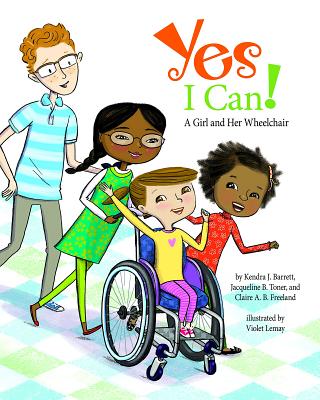Yes I Can!: A Girl and Her Wheelchair

Yes I Can!: A Girl and Her Wheelchair
Carolyn is in a wheelchair, but she doesn't let that stop her! She can do almost everything the other kids can, even if sometimes she has to do it a little differently. Includes a Note to Parents, Caregivers, and Teachers with more information on discussing disabilities with children and helping them to build positive, empathic relationships.
This is Carolyn. Like many kids her age, Carolyn loves animals, castles, and building with blocks.
She is helpful to her mom and dad and even to her baby brother.
Carolyn started a new school this year.
She thinks her teacher seems nice and she is getting to know her classmates.
The other students are curious about Carolyn because she uses a wheelchair. Carolyn is a happy, energetic, caring first-grader who just happens to be in a wheelchair. She's excited to start her new year of school and make new friends. Yes I Can! follows Carolyn on a typical day at home, at school, and even on a field trip! She can do almost everything the other kids can, even if sometimes she has to do it a little differently. Includes a Note to Parents, Caregivers, and Teachers with more information on discussing disabilities with children and helping them to build positive, empathic relationships. From the Note to Parents, Caregivers, and Teachers: Sometimes, even with answers to questions, some children continue to be reluctant to interact with a classmate with a disability. Encourage your children to smile and say hello. If you are a parent or caregiver, reach out to the parent of the child who uses a wheelchair and suggest a play date. Talk to your child about their reluctance. Help them put their worries into words. It can be easier to address specific worries or questions, like we did above, than an unspecified reluctance. If you are reading this book because your child has teased or made fun of a classmate with a disability, remind them that all children have feelings and that their classmate feels hurt just like your child would if someone teased them. Model kindness toward people with disabilities. Demonstrate making eye contact with and saying hello to people in wheelchairs. With some
PRP: 105.34 Lei
Acesta este Prețul Recomandat de Producător. Prețul de vânzare al produsului este afișat mai jos.
94.81Lei
94.81Lei
105.34 LeiIndisponibil
Descrierea produsului
Carolyn is in a wheelchair, but she doesn't let that stop her! She can do almost everything the other kids can, even if sometimes she has to do it a little differently. Includes a Note to Parents, Caregivers, and Teachers with more information on discussing disabilities with children and helping them to build positive, empathic relationships.
This is Carolyn. Like many kids her age, Carolyn loves animals, castles, and building with blocks.
She is helpful to her mom and dad and even to her baby brother.
Carolyn started a new school this year.
She thinks her teacher seems nice and she is getting to know her classmates.
The other students are curious about Carolyn because she uses a wheelchair. Carolyn is a happy, energetic, caring first-grader who just happens to be in a wheelchair. She's excited to start her new year of school and make new friends. Yes I Can! follows Carolyn on a typical day at home, at school, and even on a field trip! She can do almost everything the other kids can, even if sometimes she has to do it a little differently. Includes a Note to Parents, Caregivers, and Teachers with more information on discussing disabilities with children and helping them to build positive, empathic relationships. From the Note to Parents, Caregivers, and Teachers: Sometimes, even with answers to questions, some children continue to be reluctant to interact with a classmate with a disability. Encourage your children to smile and say hello. If you are a parent or caregiver, reach out to the parent of the child who uses a wheelchair and suggest a play date. Talk to your child about their reluctance. Help them put their worries into words. It can be easier to address specific worries or questions, like we did above, than an unspecified reluctance. If you are reading this book because your child has teased or made fun of a classmate with a disability, remind them that all children have feelings and that their classmate feels hurt just like your child would if someone teased them. Model kindness toward people with disabilities. Demonstrate making eye contact with and saying hello to people in wheelchairs. With some
Detaliile produsului










